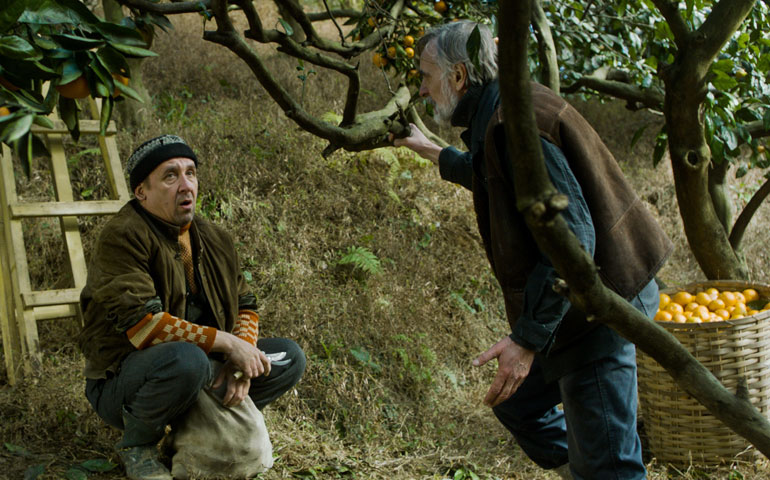
One distinguishing feature of a parable is that it is an ordinary story made to stand on its head. The shepherd leaves the herd of 99 to rescue the one lost sheep. A father chooses to celebrate the return of his prodigal son instead of meting out appropriate punishment. The Samaritan proves himself "good" when it is he, not the Levite or the priest, who shows mercy to a man in dire need.
The 2014 Oscar-nominated Estonian-Georgian film "Tangerines" (directed by Zaza Urushadze) may be considered a cinematic parable. It brings two soldiers, bitter representatives of rival ethnic factions, under one roof, and insists on what sociohistorical givens do not warrant -- reconciliation and friendship.
Ivo (Lembit Ulfsak) is a grandfather with the weathered face of a soulful patriarch. He works as a carpenter, building wooden crates to be used to transport the tangerines grown in the orchard of his neighbor Margus (Elmo Nüganen). It is 1992, in the immediate aftermath of the dissolution of the Soviet Union, and they are two of only a remnant of Estonians who still remain in the factiously declared independent state of Abkhazia, which was formerly under the territory of Soviet-controlled Georgia.
In their remote valley home, the two men are shielded from the ethnic conflict that plagues the region. But not for long. A clash between a group of Georgian soldiers and Abkhazian separatists, here represented by two Chechen mercenaries, disrupt the fragile peace, and Ivo ends up housing and nursing two wounded survivors from each side -- the Chechen Ahmed (Giorgi Nakhashidze) and the Georgian Niko (Mikheil Meskhi). At this point, it is clear that the film is not so much interested in depicting war as it is in closely observing the intimate human drama that is about to unfold.
Ivo's small cottage becomes a tinderbox. There is no shortage of testosterone-driven aggression ready to detonate each time the two men come face to face at the dinner table. Yet, director Urushadze deftly maintains an effective restraint, often depicting the anger and alienation through eloquent facial poetics and piercing eye contact.
Out of respect for Ivo, whom he calls his "savior," Ahmed has sworn not to kill Niko for as long as he remains within the perimeter of Ivo's house. "Don't even extend your head out, as I will chop it off at once," he warns.
Disarming the threat with sarcastic humor, Ivo responds, "But can he pee out the window?"
Ahmed smirks in response, but the incensed Niko throws a cupful of hot tea on his nemesis' shirt.
In another instance, the two grown men squabble over the music playing on the tape recorder. In both occasions, only Ivo's refereeing prevents a puerile brawl. The scene underlines the fact that the elderly Ivo is, on a level deeper than just physiological, truly older and more rooted than either of the recipients of his care and hospitality.
Ivo is a complex, superbly conceived character; he is compassionate but steely, available but inaccessible. Not until the latter part of the story does he volunteer information about his attractive granddaughter whose framed photograph catches the interest of both men.
Ultimately, the peaceful zone that is Ivo's homestead provides for safe space for the germination of a fragile but palpable reconciliation. The animosity between Ahmed and Niko thaws organically and incrementally as they find common ground in their very humanity. When they come to share about the people who were killed in the bloody skirmish that had transpired earlier, they find cryptic words to mutually apologize for their respective losses.
There are allusions to the role of religion here, with Ahmed shown performing Islamic prayer duties, and Niko wearing a crucifix around his neck (he hides it when Ahmed catches a glimpse of it).
"We honor the Christian religion," Ahmed notes, to which Niko responds, "We honor other religions too."
Later, when Ivo has a private chat with Niko, he discovers that the young man was once a theater and film actor. The human backstory of a soldier at war, often obscured by the singular call of duty to attack and defend, is revealed here in soft focus. It is as though a dark cloud lifts from Niko and we begin to see a glimmer of the genuine humanity that war has failed to obliterate.
Ivo, for the first time, shares more about his granddaughter, as though bridging Niko virtually to her, and then he speaks about watching the actor perform again when the war is over.
"Ahmed will be with me. And will clap for you," he muses.
In one of the film's most moving turns, Ivo good-naturedly gives Niko an anticipatory round of applause for a dream performance set in an alternative war-free reality that is yet to come. To dream is to hope.
The film's final stretch is as tragic as it is hopeful. Perhaps those of us weaned on neat closures and happy endings will echo the humorously sardonic quip made in an early scene when Ivo and Margus push a wrecked Georgian truck down the hill. It does not explode like in the movies, prompting Ivo to comment, "The cinema is a big fraud."
To be sure, the unexpected ending of "Tangerines" does not make it a big fraud; it simply makes a small story stand on its head. You'd find that in investing 87 minutes of your time for "Tangerines," you had viewed not just a poignant anti-war film, but a beautifully realized cinematic parable.
[Precious Blood Br. Antonio D. Sison is a faculty member at Catholic Theological Union, Chicago, and author of the upcoming book The Sacred Foodways of Film. "Tangerines" is available on DVD and video streaming from First Run Features.]




